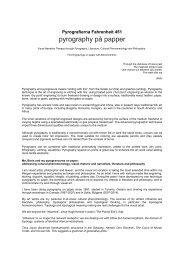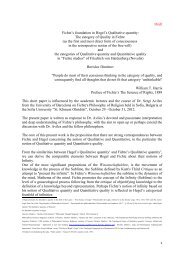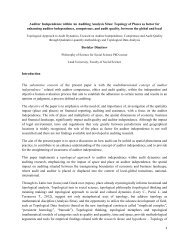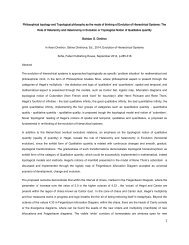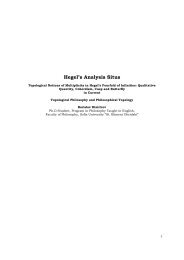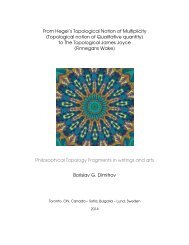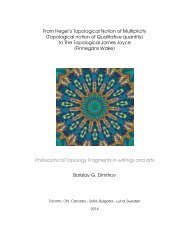Topological Ontology and Logic of Qualitative quantity
Qualitative quantity and BFO (Basic Formal Ontology) of /Barry Smith/ and YAMATO (Yet Another More Advanced Top-level Ontology) of /Riichiro Mizoguchi/
Qualitative quantity and BFO (Basic Formal Ontology) of /Barry Smith/ and YAMATO (Yet Another More Advanced Top-level Ontology) of /Riichiro Mizoguchi/
- No tags were found...
You also want an ePaper? Increase the reach of your titles
YUMPU automatically turns print PDFs into web optimized ePapers that Google loves.
series <strong>of</strong> Measure Relations” /b/, <strong>and</strong> in “Elective Affinity” /c/. The notion <strong>of</strong> “qualitative<br />
<strong>quantity</strong>” is the reason for Hegel to quote Carl Linnaeus’s “Nature Does Not Make Leaps”/ §<br />
774/.<br />
Hegel’s emphasis on the leap <strong>and</strong> nodal line in the relationship <strong>of</strong> qualitative <strong>and</strong><br />
quantitative <strong>and</strong> the reason to set in brakets the Carl Linnaeus aphorism “Nature Does Not<br />
Make Leaps” /natura non facit saltus/, comes from the point <strong>of</strong> observeability <strong>and</strong><br />
perceptability. This consideration is clear in Hegel:<br />
“In thinking about the gradualness <strong>of</strong> the coming-to-be <strong>of</strong> something, it is ordinarily<br />
assumed that what comes to be is already sensibly or actually in existence; it is not yet<br />
perceptible only because <strong>of</strong> its smallness. Similarly with the gradual disappearance <strong>of</strong><br />
something, the non-being or other which takes its place is likewise assumed to be really<br />
there, only not observable, <strong>and</strong> there, too, not in the sense <strong>of</strong> being implicitly or ideally<br />
contained in the first something, but really there, only not observable.” /§ 777/.<br />
It looks like Hegel’s emphasis on the leap <strong>and</strong> quality /that breaks in/per saltum is<br />
considerd with our human ability to percept <strong>and</strong> observe easy qualitative difference <strong>of</strong><br />
something apparent, that lack “smallness” – large enough to be noticed, something visible<br />
<strong>and</strong> observable. It seems that qualitative <strong>quantity</strong> is ignored because <strong>of</strong> its notion <strong>of</strong><br />
gradualness <strong>and</strong> lack <strong>of</strong> ability to leap as quality per saltum. Emphasizing on the<br />
transformation <strong>of</strong> quality to quality by leaps “per saltum” in the “nodal Line <strong>of</strong> Measure<br />
Relations”, in § 777 Hegel defines “the attempt to explain coming-to-be or ceasing-to-be on<br />
the basis <strong>of</strong> gradualness <strong>of</strong> the alteration” as “tedious like any tautology”. Hiding the<br />
qualitative <strong>quantity</strong> behind the curtains <strong>of</strong> “tautology”, in his liturgy <strong>of</strong> quality per saltum,<br />
Hegel is “misleading” the philosophers following him, specially the dialectical materialism<br />
<strong>of</strong> Engels <strong>and</strong> Marx, who created the clishe <strong>of</strong> first law <strong>of</strong> dialectic <strong>of</strong> transition <strong>of</strong> <strong>quantity</strong><br />
into quality <strong>and</strong> visa versa.<br />
Hegel’s notion <strong>of</strong> the “qualitative <strong>quantity</strong>” became subject <strong>of</strong> discussion in the very<br />
beginning <strong>of</strong> the Twenty century by John Grier Hibben in his “Hegel’s <strong>Logic</strong>: An Essay in<br />
Interpretation” /1902/. 47 Discussing “quantitative relation”, in Chapter VIII: “Quantity”,<br />
John Grier Hibben asserted:<br />
“…the concept <strong>of</strong> <strong>quantity</strong> will not explain it /the nature <strong>of</strong> quantitative relation”- my<br />
note/ satisfactorily, <strong>and</strong> we fall back again upon the idea <strong>of</strong> quality in order to account for<br />
it. Thus the idea <strong>of</strong> quality was found to be partial, <strong>and</strong> when developed to its utmost limit,<br />
carried our thought over into the sphere <strong>of</strong> <strong>quantity</strong>. Then the idea <strong>of</strong> <strong>quantity</strong> when fully<br />
developed brought us back again to that <strong>of</strong> quality. Is the movement <strong>of</strong> thought only a circle<br />
that merely brings us back to the starting-point According to Hegel’s method, the<br />
incompleteness <strong>of</strong> thought at this stage is overcome by the dialectic process which combines<br />
these two ideas <strong>of</strong> quality <strong>and</strong> <strong>of</strong> <strong>quantity</strong> into one complete relation representing an<br />
advanced <strong>and</strong> higher point <strong>of</strong> view. This relation Hegel calls that <strong>of</strong> qualitative <strong>quantity</strong>,<br />
or <strong>of</strong> measure (das Maass). This is the third <strong>and</strong> last stage in the development <strong>of</strong> the idea <strong>of</strong><br />
<strong>quantity</strong>, <strong>and</strong> represents, as Hegel insists, both the unity <strong>and</strong> the truth <strong>of</strong> quality <strong>and</strong> <strong>of</strong><br />
<strong>quantity</strong> combined. “ 48<br />
To my knowledge, in contemporary dialectics <strong>and</strong> philosophical research the significant<br />
notion <strong>of</strong> Hegel’s category “qualitative <strong>quantity</strong>” remained inapparent /In Heidegger’s sense<br />
<strong>of</strong> his “Phenomenology <strong>of</strong> Inapparent”. 49 Reason for this is probably Hegel’s on warning<br />
47 John Grier Hibben in his “Hegel’s <strong>Logic</strong>: An Essay in Interpretation”, 1902<br />
48 Ibid<br />
49 Martin Heidegger, “Phenomenology <strong>of</strong> the inapparent” /“Phänomenologie des Unscheinbaren”/ Seminar in<br />
Zähringen 1973<br />
25





